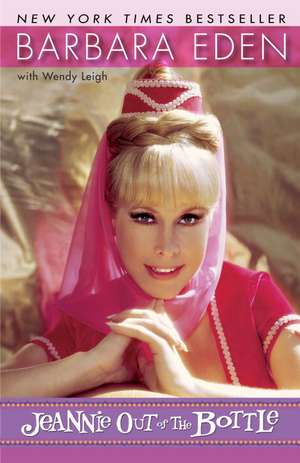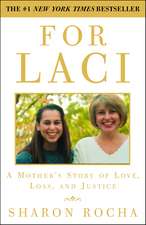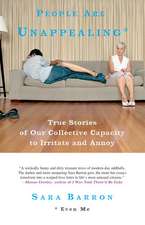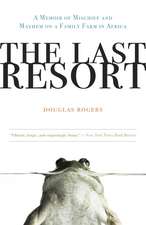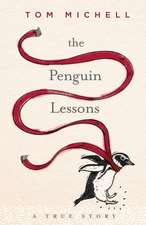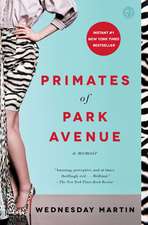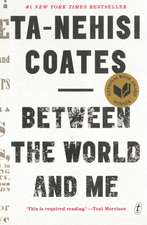Jeannie Out of the Bottle
Autor Barbara Eden, Wendy Leighen Limba Engleză Paperback – 31 mar 2012
A magical, heartwarming memoir from one of Hollywood’s most beloved icons
Over the past four decades, the landmark NBC hit television series I Dream of Jeannie has delighted generations of audiences and inspired untold numbers of teenage crushes on its beautiful blond star, Barbara Eden. Part pristine Hollywood princess and part classic bombshell, with innocence, strength, and comedic talent to spare, Barbara finally lets Jeannie out of her bottle to tell her whole story.
Jeannie Out of the Bottle takes us behind the scenes of I Dream of Jeannie as well as Barbara’s dozens of other stage, movie, television, and live concert performances. We follow her from the hungry years when she was a struggling studio contract player at 20th Century Fox through difficult weeks trying to survive as a chorus girl at Ciro’s Sunset Strip supper club, from a stint as Johnny Carson’s sidekick on live TV to tangling on-screen and off with some of Hollywood’s most desirable leading men, including Elvis Presley, Clint Eastwood, Paul Newman, and Warren Beatty. From the ups and downs of her relationship with her Jeannie co-star Larry Hagman to a touching meeting with an exquisite and vulnerable Marilyn Monroe at the twilight of her career, readers join Barbara on a thrilling journey through her five decades in Hollywood.
But Barbara’s story is also an intimate and honest memoir of personal tragedy: a stillborn child with her first husband, Michael Ansara; a verbally abusive, drug-addicted second husband; the loss of her beloved mother; and the accidental heroin-induced death of her adult son, just months before his wedding. With candor and poignancy, Barbara reflects on the challenges she has faced, as well as the joys she has experienced and how she has maintained her humor, optimism, and inimitable Jeannie magic throughout the roller-coaster ride of a truly memorable life.
Illustrated with sixteen pages of photographs, including candid family pictures and rare publicity stills, Jeannie Out of the Bottle is a must-have for every fan, old and new.
From the Hardcover edition.
Preț: 111.51 lei
Nou
Puncte Express: 167
Preț estimativ în valută:
21.34€ • 22.34$ • 17.66£
21.34€ • 22.34$ • 17.66£
Carte disponibilă
Livrare economică 15-29 martie
Preluare comenzi: 021 569.72.76
Specificații
ISBN-13: 9780307886965
ISBN-10: 0307886964
Pagini: 288
Ilustrații: TWO 8-PAGE B&W/COLOR INSERTS
Dimensiuni: 132 x 203 x 23 mm
Greutate: 0.23 kg
Editura: Three Rivers Press (CA)
ISBN-10: 0307886964
Pagini: 288
Ilustrații: TWO 8-PAGE B&W/COLOR INSERTS
Dimensiuni: 132 x 203 x 23 mm
Greutate: 0.23 kg
Editura: Three Rivers Press (CA)
Notă biografică
BARBARA EDEN has been a television, film, and stage actress, and a Las Vegas headliner, for more than five decades. She is best known for her title role in the hit TV series I Dream of Jeannie. She grew up in San Francisco and currently lives in Beverly Hills with her husband, Jon Eicholtz, and their Labradoodle, Djin Djin.
WENDY LEIGH is the New York Times bestselling author of thirteen books, including Life with My Sister Madonna (as co-author) and True Grace: The Life and Times of an American Princess.
From the Hardcover edition.
WENDY LEIGH is the New York Times bestselling author of thirteen books, including Life with My Sister Madonna (as co-author) and True Grace: The Life and Times of an American Princess.
From the Hardcover edition.
Extras
chapter 1
A MAGICAL CHILDHOOD
Whenever I hear the blare of a foghorn or see a picture of a mermaid or a young couple madly in love, I feel as I've been Jeannie-blinked back into my childhood, happy and secure.
The foghorn, you see, reminds me of San Francisco, where I grew up. The mermaid reminds me of Dolfina, the famous "Girl in the Fishbowl" always on display at the Bal Tabarin restaurant on Market Street, where my parents often used to bring me when I was very young, simply because they couldn't afford a babysitter and had to cart me everywhere with them.
In those far-off years during the Depression, however poor my parents were, they still hadn't forgotten how to love, how to laugh, and how to dream. They were young and carefree, spent every penny my father earned from his job as a telephone lineman, and understood exactly how to have fun.
At the time, long before my younger sister, Alison, was born, I was my mother's "onliest only," as she called me then, and would until her dying day. Like many an only child, I was probably grown-up before my time, and those nights at the Bal Tabarin (which later became Bimbo's 365 Club), where Rita Hayworth danced in the chorus and Ann Miller was discovered dancing when she was just thirteen, only served to make me more mature and at the same time give me an early love of show business.
So did seeing Bob Hope perform live onstage when I was just four years old. My mother and father took me to his show at a local theater, and I remember how joyful watching Bob made me feel. Little did I know that when I grew up, I would meet him, we'd become friends, and I'd appear onstage with him many, many times myself.
When I was a small child, my dream was to be not an actress but a singer. Each night, when I did the dishes with my mother, Alice, she sang Gilbert and Sullivan ditties or tunes from her father's favorite Irish operetta, Bohemian Girl, and I joined in. I developed a passion for singing early on in my childhood, which was only further heightened when I sang in the church choir every Sunday.
At the same time, fishing on Fisherman's Wharf with my father (although the sight of fishermen gutting their fish put me off fish for life-to this day I never eat it), roller-skating along the wharf, and bicyling in Golden Gate Park with him all contributed to making me a bit of a tomboy (which, by the way, I always thought Jeannie was as well).
I've always considered myself a California girl and have been proud of it, but in reality I was born in Tuscon, Arizona. And I always relished looking back at my mother's family history and reconstructing exactly how I ended up being born there.
I still have a remarkable letter she gave to me, which was originally bequeathed to her by her mother. It was written in 1856 by my great-great-great-grandfather, John A. Bills, to my great-great- grandparents, Bilista and William Long, after they were forced to leave New York State and go west because William, a house-painter, was dying of lead poisoning. If I could have, I would have framed it, but it is too old and too fragile, so I keep it in an acid-free envelope. All in all, I think it's a fascinating historical document (but if you don't, just skip it).
Ramsey, Illinois 28 Nov. 1856
Dear Daughter,
We rec'd your letter a few days ago and hasten to answer. We were sorry to hear that William was so feeble although it was not all together unexpected. He has been so long sick that we sometimes almost believed that thought he might at last recover-but we feel that even this letter may find you a widow and the children orphans-I sometimes feel as though you would be doubly afflicted situated as you are a stranger almost in a far off country-but it seem you are not discouraged or cast down entirely. We really hope a way will be provided for you and the little ones. Do you still feel that you had rather stay there or would you like to come back and live among your old acquaintances and friends once more.
We have sold out all our things in Troy and moved to the west. We are on a farm in a town called Ramsey it is on the Illinois South Central Railroad. As far south nearly as St. Louis. We have a very nice farm of 1110 acres and so far like it much. Gardner and George are here with us and John in Vandalia 13 miles south of us to work at his trade (dentist). Uncle Loren is out in the northern part of this state with all of his family and they seem and write that they like first rate. Uncle Alanson is still in New York. Alonzo has gone to sea again this time to Calcutta. I suppose he is bound to be a sailor. Iarne and Abner are in stores. Claryou is at home. Samuel and Sarah live in Williamsburg opposite New York. Daniel is a carman, Uncle Luis and Nathan are in -- on their old places all well. Allen and Ester lived in Albany when we came away-have not heard from them since.
I had a letter from Mrs. Harlow sometime since they live in Oroville and she seems to think that they are getting rich again- I hope they may. I suppose Mrs. Alfred Smith is out there as she has sold all her furniture and was calculating to go in a few days when we left Troy the first of July-is she there and what are they about. I wish we could run in and see you and help you in your time of need-but we are a great way apart and it is not likely that I shall ever go to California again-if we had Mary & Willie home we could give them a good chance for school and bread and milk-We have two good cows and make plenty of butter and have lots of cream and milk to eat and use-I suppose they are great children now and hope they are and always will be good children and do all they can to help their mother through life.
Now Bilista I should like to know how you are situated to get a living- can you earn enough to make yourself and children comfortable-do you intend to stay there and work and do all you can to make a living or do you sometimes wish you was back again-I wish you would write me as to how you feel about it-We think this is a good and healthy country- My health and your mother's is much better than it was in Troy and so far we are not sorry we moved-Please write soon and often and we will write often now that we are settled down once more-Give our respects to Mr. & Mrs. Smith if she is there-and finally give our respects to all our old acquaintances if you see any of them.
Goodbye and may the Lord give you strength to endure whatever you may be called to go through.
Direct your letter "John A Bills, Ramsey-Fayette Co Illinois."
Your Father John A Bills
Mrs. Bilista A Long San Francisco Cal
The Mary mentioned in the letter was my great-grandmother, Mary Dorothea Long, who came west in the covered wagon with her parents, Bilista and William Long, when she was only four years old. After her parents' untimely deaths, she was raised by nuns in San Francisco.
My great-grandfather, Richard O'Leary, was born in County Cork, Ireland. When he was a child during the potato famine, his parents, hoping to save his life, put him on a ship bound for the New World. That ship turned out to be one of the "coffin boats," so named because so many children who sailed on them died of starvation or disease during the harsh and unforgiving Atlantic crossing.
Richard O'Leary was one of the lucky ones; he survived. At fifteen years old, still unable to read and write, he took a job building the transcontinental railroad and ended up in Marysville, California, where he met a priest and confided to him that he wanted a wife.
The priest relayed that information to my great-grandmother, Mary, who thought about it for a bit, then informed the priest, "I'll walk out with him." So that's what she did, for just one week, at the end of which she announced to the priest, "I'll marry him," and did.
She went on to teach my great-grandfather to read and write, and had nine children along the way as well, one of whom was my maternal grandmother, Frances Elvira O'Leary, who was born in Nevada and went to school there.
Meanwhile, back east in Pennsylvania, my maternal grandfather-to-be, Charles Benjamin Franklin (a distant relative of the great man himself), the son of an Englishwoman, was orphaned at nine after his parents were killed in a carriage accident.
On discovering that young Charles had been left alone in the world, his two maternal aunts sailed from England to America, determined to bring him back home to the old country with them. The aunts realized Charles was happy in his new home and allowed my grandfather to stay. However, later, he ran away from home, apprenticed himself to a ship's carpenter, and sailed the seven seas.
By the time Charles arrived back in America, he had married, divorced, and along the way become an accomplished carpenter, adept at all branches of the trade, including cabinetry. Finally he turned up in Nevada, where he booked into a small boardinghouse. There, one morning, a beautiful young girl-Frances Elvira O'Leary-served him breakfast.
Although he was entranced by her charms, he nevertheless couldn't help noticing that she kept rubbing her cheek. Without any preamble, he demanded to know why she hadn't seen a dentist. She blushed scarlet and shook her head, whereupon he grabbed her arm and declared, "Whether you like it or not, I'm taking you to one."
He did, and within months, my grandmother, Frances Elvira O'Leary, married Charles Benjamin Franklin in San Francisco. My mother, Alice, the youngest of four children, was born in El Paso. My grandfather became a house builder and would remain so for the rest of his days, building homes in Los Angeles, El Paso, and Tuscon, Arizona, which is where I came in.
During the first two or three years of my life, because money was quite scarce, we lived in Tucson and then El Paso with my grandparents. My earliest memory is of sleeping in one bed with my mother, in the morning watching her get dressed for work, and being overwhelmed by her youth and beauty.
In the early thirties, my mother attended business college, where she learned dictation and accounting, and eventually she got a job at the Western Auto Company. In many ways, she was ahead of her time, and truly emancipated. Thinking back to my pioneer great-grandmother and my schoolteacher grandmother, I'd have to say that I was born of strong women, and that thought makes me proud.
Yet these women were also warm and loving, and I'll always remember how lucky I felt as a little girl to have my mother's hand to hold on to, and my grandmother's as well. My grandmother would hold my hand loosely, my mother more firmly, but either way, they both made me feel safe and loved.
My mother was the baby of her family and was particularly close to her sister, Margie, who lived in San Marino, not far from LA (of which more later). Margie was as pretty as my mother, possessed a vivid, whimsical imagination, and christened everyone in the family with secret fairy names. I was dubbed "Music." My mother was "Smile." And Aunt Margie called herself "Mischief."
I guess I must have inherited Aunt Margie's fanciful imagination, because from the time I was a small child, I had three fantasy friends: Dagolyn, a girl; Good Johnny, a boy; and Bad Johnny, who I believed lived under my bed. Dagolyn and the two Johnnies were always a rich and vibrant part of my childhood imagination, though I loved Good Johnny best. Looking back, I can't help wondering at the coincidence that my current husband, the love of my life, is named Jon.
Margie and my mother loved practical jokes and were always playing tricks on each other and the rest of the family. One time, my father (who didn't like anyone to look at his feet, and always made sure to wear slippers or shoes) was fast asleep, and Margie and my mother sneaked into his room. While he was snoring away, they pulled back the bedcovers and painted his toenails red. When he woke up and caught sight of his bright red toenails, he went ballistic, but then calmed down and laughed uproariously.
Another time, one of my uncles, who worked for the government, had to attend a crucial business meeting, and when he wasn't looking, Margie and my mother sewed up one of his pant legs so he couldn't get it on. They were always playing practical jokes like that, and I was always vastly entertained by all their pranks, however childish.
My grandfather, Charles Benjamin Franklin, was a loving and kind man who took great care of me. At the end of most days, he'd put his snap- brimmed hat on, say, "Get your hat, Barbara Jean" (which is what my grandparents and everyone else called me back then), take me by the hand, and set off for the grocery store with me.
On the way back, he'd always stop at a bar and have a beer; I had a soda. One day I came home and informed my grandmother that I'd drunk a whole glass of beer all by myself. Such was the force of the conviction in my voice that she believed me and practically had a fit until my grandfather convinced her otherwise.
My grandfather had beautiful reddish brown curly hair, and I remember when I was about three and asked, "Can I wash your hair, Grandpa?" and he let me. Even then, it was clear that he couldn't refuse me anything.
One day I begged him to buy me a pair of red shoes, and he did. When my grandmother saw them, she screamed, "Charles!" and whisked them away from me, putting them out on the fence. My grandfather and I exchanged rueful glances, but both of us knew better than to go against my grandmother's iron will. By morning they had vanished, and I never saw them again.
Another time, I overheard my mother and my grandmother saying that they were going to the movies. Off they went, leaving me at home with my grandfather. I went over to him, tugged on his coattail, and said, "Grandpa?" Without looking up from his newspaper, he said, "Yes, child?" Encouraged, I went on, "Grandpa, would you take me to the movies?" Without a moment's pause he said, "Yes, child." Then he put on his hat, and off we went together.
From the Hardcover edition.
A MAGICAL CHILDHOOD
Whenever I hear the blare of a foghorn or see a picture of a mermaid or a young couple madly in love, I feel as I've been Jeannie-blinked back into my childhood, happy and secure.
The foghorn, you see, reminds me of San Francisco, where I grew up. The mermaid reminds me of Dolfina, the famous "Girl in the Fishbowl" always on display at the Bal Tabarin restaurant on Market Street, where my parents often used to bring me when I was very young, simply because they couldn't afford a babysitter and had to cart me everywhere with them.
In those far-off years during the Depression, however poor my parents were, they still hadn't forgotten how to love, how to laugh, and how to dream. They were young and carefree, spent every penny my father earned from his job as a telephone lineman, and understood exactly how to have fun.
At the time, long before my younger sister, Alison, was born, I was my mother's "onliest only," as she called me then, and would until her dying day. Like many an only child, I was probably grown-up before my time, and those nights at the Bal Tabarin (which later became Bimbo's 365 Club), where Rita Hayworth danced in the chorus and Ann Miller was discovered dancing when she was just thirteen, only served to make me more mature and at the same time give me an early love of show business.
So did seeing Bob Hope perform live onstage when I was just four years old. My mother and father took me to his show at a local theater, and I remember how joyful watching Bob made me feel. Little did I know that when I grew up, I would meet him, we'd become friends, and I'd appear onstage with him many, many times myself.
When I was a small child, my dream was to be not an actress but a singer. Each night, when I did the dishes with my mother, Alice, she sang Gilbert and Sullivan ditties or tunes from her father's favorite Irish operetta, Bohemian Girl, and I joined in. I developed a passion for singing early on in my childhood, which was only further heightened when I sang in the church choir every Sunday.
At the same time, fishing on Fisherman's Wharf with my father (although the sight of fishermen gutting their fish put me off fish for life-to this day I never eat it), roller-skating along the wharf, and bicyling in Golden Gate Park with him all contributed to making me a bit of a tomboy (which, by the way, I always thought Jeannie was as well).
I've always considered myself a California girl and have been proud of it, but in reality I was born in Tuscon, Arizona. And I always relished looking back at my mother's family history and reconstructing exactly how I ended up being born there.
I still have a remarkable letter she gave to me, which was originally bequeathed to her by her mother. It was written in 1856 by my great-great-great-grandfather, John A. Bills, to my great-great- grandparents, Bilista and William Long, after they were forced to leave New York State and go west because William, a house-painter, was dying of lead poisoning. If I could have, I would have framed it, but it is too old and too fragile, so I keep it in an acid-free envelope. All in all, I think it's a fascinating historical document (but if you don't, just skip it).
Ramsey, Illinois 28 Nov. 1856
Dear Daughter,
We rec'd your letter a few days ago and hasten to answer. We were sorry to hear that William was so feeble although it was not all together unexpected. He has been so long sick that we sometimes almost believed that thought he might at last recover-but we feel that even this letter may find you a widow and the children orphans-I sometimes feel as though you would be doubly afflicted situated as you are a stranger almost in a far off country-but it seem you are not discouraged or cast down entirely. We really hope a way will be provided for you and the little ones. Do you still feel that you had rather stay there or would you like to come back and live among your old acquaintances and friends once more.
We have sold out all our things in Troy and moved to the west. We are on a farm in a town called Ramsey it is on the Illinois South Central Railroad. As far south nearly as St. Louis. We have a very nice farm of 1110 acres and so far like it much. Gardner and George are here with us and John in Vandalia 13 miles south of us to work at his trade (dentist). Uncle Loren is out in the northern part of this state with all of his family and they seem and write that they like first rate. Uncle Alanson is still in New York. Alonzo has gone to sea again this time to Calcutta. I suppose he is bound to be a sailor. Iarne and Abner are in stores. Claryou is at home. Samuel and Sarah live in Williamsburg opposite New York. Daniel is a carman, Uncle Luis and Nathan are in -- on their old places all well. Allen and Ester lived in Albany when we came away-have not heard from them since.
I had a letter from Mrs. Harlow sometime since they live in Oroville and she seems to think that they are getting rich again- I hope they may. I suppose Mrs. Alfred Smith is out there as she has sold all her furniture and was calculating to go in a few days when we left Troy the first of July-is she there and what are they about. I wish we could run in and see you and help you in your time of need-but we are a great way apart and it is not likely that I shall ever go to California again-if we had Mary & Willie home we could give them a good chance for school and bread and milk-We have two good cows and make plenty of butter and have lots of cream and milk to eat and use-I suppose they are great children now and hope they are and always will be good children and do all they can to help their mother through life.
Now Bilista I should like to know how you are situated to get a living- can you earn enough to make yourself and children comfortable-do you intend to stay there and work and do all you can to make a living or do you sometimes wish you was back again-I wish you would write me as to how you feel about it-We think this is a good and healthy country- My health and your mother's is much better than it was in Troy and so far we are not sorry we moved-Please write soon and often and we will write often now that we are settled down once more-Give our respects to Mr. & Mrs. Smith if she is there-and finally give our respects to all our old acquaintances if you see any of them.
Goodbye and may the Lord give you strength to endure whatever you may be called to go through.
Direct your letter "John A Bills, Ramsey-Fayette Co Illinois."
Your Father John A Bills
Mrs. Bilista A Long San Francisco Cal
The Mary mentioned in the letter was my great-grandmother, Mary Dorothea Long, who came west in the covered wagon with her parents, Bilista and William Long, when she was only four years old. After her parents' untimely deaths, she was raised by nuns in San Francisco.
My great-grandfather, Richard O'Leary, was born in County Cork, Ireland. When he was a child during the potato famine, his parents, hoping to save his life, put him on a ship bound for the New World. That ship turned out to be one of the "coffin boats," so named because so many children who sailed on them died of starvation or disease during the harsh and unforgiving Atlantic crossing.
Richard O'Leary was one of the lucky ones; he survived. At fifteen years old, still unable to read and write, he took a job building the transcontinental railroad and ended up in Marysville, California, where he met a priest and confided to him that he wanted a wife.
The priest relayed that information to my great-grandmother, Mary, who thought about it for a bit, then informed the priest, "I'll walk out with him." So that's what she did, for just one week, at the end of which she announced to the priest, "I'll marry him," and did.
She went on to teach my great-grandfather to read and write, and had nine children along the way as well, one of whom was my maternal grandmother, Frances Elvira O'Leary, who was born in Nevada and went to school there.
Meanwhile, back east in Pennsylvania, my maternal grandfather-to-be, Charles Benjamin Franklin (a distant relative of the great man himself), the son of an Englishwoman, was orphaned at nine after his parents were killed in a carriage accident.
On discovering that young Charles had been left alone in the world, his two maternal aunts sailed from England to America, determined to bring him back home to the old country with them. The aunts realized Charles was happy in his new home and allowed my grandfather to stay. However, later, he ran away from home, apprenticed himself to a ship's carpenter, and sailed the seven seas.
By the time Charles arrived back in America, he had married, divorced, and along the way become an accomplished carpenter, adept at all branches of the trade, including cabinetry. Finally he turned up in Nevada, where he booked into a small boardinghouse. There, one morning, a beautiful young girl-Frances Elvira O'Leary-served him breakfast.
Although he was entranced by her charms, he nevertheless couldn't help noticing that she kept rubbing her cheek. Without any preamble, he demanded to know why she hadn't seen a dentist. She blushed scarlet and shook her head, whereupon he grabbed her arm and declared, "Whether you like it or not, I'm taking you to one."
He did, and within months, my grandmother, Frances Elvira O'Leary, married Charles Benjamin Franklin in San Francisco. My mother, Alice, the youngest of four children, was born in El Paso. My grandfather became a house builder and would remain so for the rest of his days, building homes in Los Angeles, El Paso, and Tuscon, Arizona, which is where I came in.
During the first two or three years of my life, because money was quite scarce, we lived in Tucson and then El Paso with my grandparents. My earliest memory is of sleeping in one bed with my mother, in the morning watching her get dressed for work, and being overwhelmed by her youth and beauty.
In the early thirties, my mother attended business college, where she learned dictation and accounting, and eventually she got a job at the Western Auto Company. In many ways, she was ahead of her time, and truly emancipated. Thinking back to my pioneer great-grandmother and my schoolteacher grandmother, I'd have to say that I was born of strong women, and that thought makes me proud.
Yet these women were also warm and loving, and I'll always remember how lucky I felt as a little girl to have my mother's hand to hold on to, and my grandmother's as well. My grandmother would hold my hand loosely, my mother more firmly, but either way, they both made me feel safe and loved.
My mother was the baby of her family and was particularly close to her sister, Margie, who lived in San Marino, not far from LA (of which more later). Margie was as pretty as my mother, possessed a vivid, whimsical imagination, and christened everyone in the family with secret fairy names. I was dubbed "Music." My mother was "Smile." And Aunt Margie called herself "Mischief."
I guess I must have inherited Aunt Margie's fanciful imagination, because from the time I was a small child, I had three fantasy friends: Dagolyn, a girl; Good Johnny, a boy; and Bad Johnny, who I believed lived under my bed. Dagolyn and the two Johnnies were always a rich and vibrant part of my childhood imagination, though I loved Good Johnny best. Looking back, I can't help wondering at the coincidence that my current husband, the love of my life, is named Jon.
Margie and my mother loved practical jokes and were always playing tricks on each other and the rest of the family. One time, my father (who didn't like anyone to look at his feet, and always made sure to wear slippers or shoes) was fast asleep, and Margie and my mother sneaked into his room. While he was snoring away, they pulled back the bedcovers and painted his toenails red. When he woke up and caught sight of his bright red toenails, he went ballistic, but then calmed down and laughed uproariously.
Another time, one of my uncles, who worked for the government, had to attend a crucial business meeting, and when he wasn't looking, Margie and my mother sewed up one of his pant legs so he couldn't get it on. They were always playing practical jokes like that, and I was always vastly entertained by all their pranks, however childish.
My grandfather, Charles Benjamin Franklin, was a loving and kind man who took great care of me. At the end of most days, he'd put his snap- brimmed hat on, say, "Get your hat, Barbara Jean" (which is what my grandparents and everyone else called me back then), take me by the hand, and set off for the grocery store with me.
On the way back, he'd always stop at a bar and have a beer; I had a soda. One day I came home and informed my grandmother that I'd drunk a whole glass of beer all by myself. Such was the force of the conviction in my voice that she believed me and practically had a fit until my grandfather convinced her otherwise.
My grandfather had beautiful reddish brown curly hair, and I remember when I was about three and asked, "Can I wash your hair, Grandpa?" and he let me. Even then, it was clear that he couldn't refuse me anything.
One day I begged him to buy me a pair of red shoes, and he did. When my grandmother saw them, she screamed, "Charles!" and whisked them away from me, putting them out on the fence. My grandfather and I exchanged rueful glances, but both of us knew better than to go against my grandmother's iron will. By morning they had vanished, and I never saw them again.
Another time, I overheard my mother and my grandmother saying that they were going to the movies. Off they went, leaving me at home with my grandfather. I went over to him, tugged on his coattail, and said, "Grandpa?" Without looking up from his newspaper, he said, "Yes, child?" Encouraged, I went on, "Grandpa, would you take me to the movies?" Without a moment's pause he said, "Yes, child." Then he put on his hat, and off we went together.
From the Hardcover edition.
